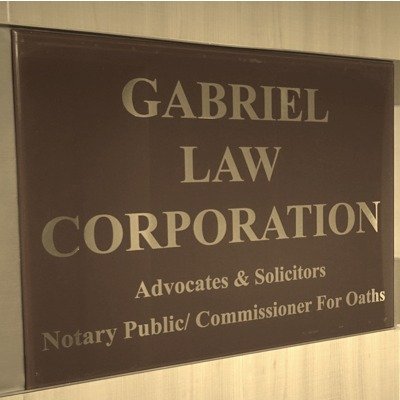Best Child Visitation Lawyers in Raffles Place
Share your needs with us, get contacted by law firms.
Free. Takes 2 min.
Free Guide to Hiring a Family Lawyer
List of the best lawyers in Raffles Place, Singapore
Singapore Child Visitation Legal Articles
Browse our 2 legal articles about Child Visitation in Singapore written by expert lawyers.
- The Fundamentals of Commencing a Divorce in Singapore
- There is actually only one ground of divorce in Singapore; the irretrievable breakdown of the marriage which is to be found in Section 95 of the Women’s Charter. To prove that the marriage has irretrievably broken down, you must be able to prove to the Court one of the 5... Read more →
- Ancillary Matters: Child Custody, Care & Control, Access of Children
- This article will only apply to parties with children under 21 years old. The Court has repeatedly placed emphasis on the best interests of the welfare of the children. The children’s welfare is measured in terms monetary and physical comfort with the parent, the ties of affection with the parent,... Read more →
About Child Visitation Law in Raffles Place, Singapore
The Child Visitation Law in Raffles Place, Singapore, is followed by the best interest principle, which emphasizes children's welfare in decisions about custody and visitation rights. While the court generally encourages both parents to participate in their child's upbringing, the parent without custody is often granted visitation rights unless it impairs the child's wellbeing. Laws regarding visitation can be complicated, making it crucial for the parties involved to consult legal advice.
Why You May Need a Lawyer
Several complex situations may make it crucial to hire a lawyer. For instance, you may need legal consultation if the custodial parent refuses to honor your visitation rights or if the existing agreement seems unsuitable. If there are concerns about your child's safety or welfare during their visits with the other parent, or if you need help negotiating an agreement, a child visitation lawyer can assist. Similarly, if international aspects are to be considered, such as one parent residing overseas, it’d be advisable to have legal representation.
Local Laws Overview
In Raffles Place, Singapore, the Women's Charter governs local laws related to child visitation. While the court commonly grants custody to one parent, they acknowledge the importance of shared involvement in raising the child. Hence, access or visitation is usually given to the non-custodial parent. More complex cases, such as those where the parents hold different nationalities and one parent wishes to leave Singapore, further necessitate understanding local legal nuances. International matters are typically governed by The Hague Convention.
Frequently Asked Questions
1. What are my rights as a non-custodial parent?
As a non-custodial parent, you usually have the right to spend time with your child, unless it is not in the child's best interest.
2. Can the custodial parent deny me visitation rights?
The custodial parent doesn't have the authority to deny you visitation rights unless they have a court order justifying such denial.
3. What if I am not satisfied with the current visitation arrangement?
If the current visitation schedule doesn't seem to work, you can seek legal aid and apply for a variation to the court order.
4. Can I relocate with my child as the custodial parent?
If you, as the custodial parent, plan to relocate, the non-custodial parent’s visitation rights must be respected. You might require a court permit to do so.
5. Can a lawyer help with cross-border child visitation issues?
Indeed, a lawyer can assist in understanding and navigating cross-border child visitation rights, especially regarding applying The Hague Convention.
Additional Resources
The Singapore Family Justice Courts website, Ministry of Social and Family Development, and governmental organisations like the Law Society of Singapore Pro Bono Services can provide more information about child visitation laws.
Next Steps
Should you need legal assistance in child visitation, the next step would be to consult a lawyer specializing in family law in Singapore. Given the complexity of these laws, having a lawyer would help navigate the process, ensure your rights are protected, and that decisions are made in the child's best interest.
Lawzana helps you find the best lawyers and law firms in Raffles Place through a curated and pre-screened list of qualified legal professionals. Our platform offers rankings and detailed profiles of attorneys and law firms, allowing you to compare based on practice areas, including Child Visitation, experience, and client feedback.
Each profile includes a description of the firm's areas of practice, client reviews, team members and partners, year of establishment, spoken languages, office locations, contact information, social media presence, and any published articles or resources. Most firms on our platform speak English and are experienced in both local and international legal matters.
Get a quote from top-rated law firms in Raffles Place, Singapore — quickly, securely, and without unnecessary hassle.
Disclaimer:
The information provided on this page is for general informational purposes only and does not constitute legal advice. While we strive to ensure the accuracy and relevance of the content, legal information may change over time, and interpretations of the law can vary. You should always consult with a qualified legal professional for advice specific to your situation.
We disclaim all liability for actions taken or not taken based on the content of this page. If you believe any information is incorrect or outdated, please contact us, and we will review and update it where appropriate.











